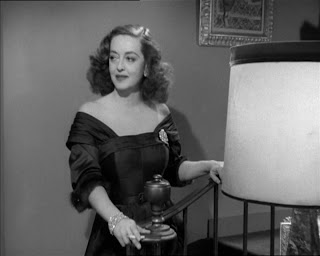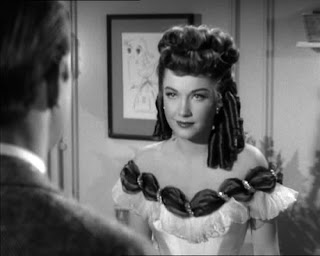TSPDT placing: #83
Directed by: Joseph L. Mankiewicz
Written by: Mary Orr (short story), Joseph L. Mankiewicz (written by)
Starring: Bette Davis, Anne Baxter, George Sanders, Celeste Holm, Gary Merrill, Marilyn Monroe, Thelma Ritter
WARNING: Plot and/or ending details may follow!!!
I don't know what it was about 1950. Perhaps filmmakers had sufficiently recovered from the destruction of WWII to finally take stock of themselves, but it is in this year that Hollywood suddenly became self-aware; and it apparently didn't like what it saw. Billy Wilder's Sunset Blvd. (1950) is cinema's most scathing satire of Hollywood's demented and destitute moral values. Likewise, Nicholas Ray's In a Lonely Place (1950) demonstrates how the studio system snuffs out genuine talent through its intent upon "selling popcorn." But it was All About Eve (1950) that truly took America by storm that year, uniting an ensemble of the industry's most charismatic stars and giving each of them acerbic mean streak that is both wonderfully compelling and entertaining. Though the film, scripted and directed by Joseph L. Mankiewicz {who is also responsible for The Ghost and Mrs. Muir (1947) and Sleuth (1972)}, specifically concerns itself with the theatre, the parallels to Hollywood are unmistakable, and such is the screenplay's apparent distaste towards the film industry that I'm almost surprised of its success.

8/10
Currently my #4 film of 1950:
1) Sunset Blvd. (Billy Wilder)
2) Harvey (Henry Koster)
3) In a Lonely Place (Nicholas Ray)
4) All About Eve (Joseph L. Mankiewicz)
5) The Asphalt Jungle (John Huston)
6) Stage Fright (Alfred Hitchcock)
7) Rashômon (Akira Kurosawa)
"Much of the fun of the film depends on a casting twist--making Baxter the bitch and Davis the doe-eyed victim. The dialogue is sharp and justly famous, though writer-director Joseph L. Mankiewicz has trouble putting it into the mouths of his actors: nothing sounds remotely natural, and the film is pervaded by the out-of-sync sense of staircase wit--this is a movie about what people wished they'd said. The hoped-for tone of Restoration comedy never quite materializes, perhaps because Mankiewicz's cynicism is only skin-deep, but the film's tinny brilliance still pleases."
Dave Kehr, Chicago Reader
"Set in the Broadway jungle rather than among the ‘sun-burnt eager beavers’ of Hollywood, Joseph L Mankiewicz’s film dissects the narcissism and hypocrisy of the spotlight as sharply as Wilder’s, but pays equal attention to the challenges of enacting womanhood. All About My Mother (not to mention Showgirls) would be unimaginable without it. Anne Baxter is Eve Harrington, the wide-eyed stage-door hanger-on who insinuates her way into the world of Bette Davis’ sacred monster, Margo Channing; butter-might-just-melt meets gin-hold-the-tonic."
Dave Walters, Time Out London
"For years, Broadway had maintained the reputation of being a nobler art than cinema, but All About Eve ruined Broadway's fame. As the Hays office loosened up, Hollywood began "stealing" Broadway's adult subject matter, leaving it without its unique trademark. All About Eve radically redefined the orthodox view of a sacrosanct theater... Aside from attacking Broadway, the film defended Hollywood against the encroachment of television. In one of the great one-liners, Sanders tells Monroe: "That's all television is, my dear. Nothing but auditions." All About Eve while ostensibly about Broadway, was in actuality an elaborate editorial praising the Hollywood system."
Emanuel Levy

 Recently-released criminal mastermind, Doc Erwin Riedenschneider (Sam Jaffe), has, for the last seven years of his incarceration, protected the plans for the most ambitious and profitable heist of his "distinguished" career. He arrives in a dreary, smoggy, crime-ridden city, where low-lifes patrol the darkened streets and law officers, some honest and some crooked, do their best to control the escalating crime-rates. The Doc hires a diverse assortment of essential criminals to ensure the success of his caper – a "boxman," or a safecracker (Anthony Caruso) with a young family, a "top-notch" getaway driver (James Whitmore) with a twisted back, and a small-time "hooligan" (Sterling Hayden) with a costly passion for horses. Also involved in the elaborate scheme is Cobby (Marc Lawrence), a sleazy, treacherous bookie, and Alonzo D. Emmerich (Louis Calhern), a bankrupt professional businessman who agrees to finance the operation but houses plans for a disastrous double-crossing. The film's female protagonists come in the form of innocent Doll Conovan (Jean Hagen, prior to her career-defining performance in 'Singin' in the Rain (1952)') and an up-and-coming Marilyn Monroe as Emmerich's sexy, playful and naive young mistress.
Recently-released criminal mastermind, Doc Erwin Riedenschneider (Sam Jaffe), has, for the last seven years of his incarceration, protected the plans for the most ambitious and profitable heist of his "distinguished" career. He arrives in a dreary, smoggy, crime-ridden city, where low-lifes patrol the darkened streets and law officers, some honest and some crooked, do their best to control the escalating crime-rates. The Doc hires a diverse assortment of essential criminals to ensure the success of his caper – a "boxman," or a safecracker (Anthony Caruso) with a young family, a "top-notch" getaway driver (James Whitmore) with a twisted back, and a small-time "hooligan" (Sterling Hayden) with a costly passion for horses. Also involved in the elaborate scheme is Cobby (Marc Lawrence), a sleazy, treacherous bookie, and Alonzo D. Emmerich (Louis Calhern), a bankrupt professional businessman who agrees to finance the operation but houses plans for a disastrous double-crossing. The film's female protagonists come in the form of innocent Doll Conovan (Jean Hagen, prior to her career-defining performance in 'Singin' in the Rain (1952)') and an up-and-coming Marilyn Monroe as Emmerich's sexy, playful and naive young mistress. As was typical in film-noir films of the era, whose contents were dictated by the meddlesome Production/Hays Code, the ultimate moral of the story is that crime doesn't pay. Each of the thieves receive punishment for their involvement in the robbery, either through conviction or death, as does the fraudulent detective (Barry Kelley) whose corruption is described as a "one in a hundred" case. Nevertheless, Huston succeeds in creating a certain amount of empathy towards the criminals, sympathetically presenting the audience with each man's reasonable motivations towards breaking the law. By recruiting our support, Huston invariably places the audience in the shoes of a criminal, suggesting, as the perfect scheme begins to unravel, that our own fates lie in the balance. This evocation of realism is certainly complemented by Harold Rosson's gritty, documentary-like cinematography, and the heist sequence itself – while falling well short of Jules Dassin's breathless 30-minute counterpart – is tense, intriguing and authentic. As Huston himself explains in a pre-film introduction on the DVD release, each of his characters is immoral, largely unlikable and driven by a debilitating vice; however, despite this, or perhaps because of it, we can't take our eyes off them.
As was typical in film-noir films of the era, whose contents were dictated by the meddlesome Production/Hays Code, the ultimate moral of the story is that crime doesn't pay. Each of the thieves receive punishment for their involvement in the robbery, either through conviction or death, as does the fraudulent detective (Barry Kelley) whose corruption is described as a "one in a hundred" case. Nevertheless, Huston succeeds in creating a certain amount of empathy towards the criminals, sympathetically presenting the audience with each man's reasonable motivations towards breaking the law. By recruiting our support, Huston invariably places the audience in the shoes of a criminal, suggesting, as the perfect scheme begins to unravel, that our own fates lie in the balance. This evocation of realism is certainly complemented by Harold Rosson's gritty, documentary-like cinematography, and the heist sequence itself – while falling well short of Jules Dassin's breathless 30-minute counterpart – is tense, intriguing and authentic. As Huston himself explains in a pre-film introduction on the DVD release, each of his characters is immoral, largely unlikable and driven by a debilitating vice; however, despite this, or perhaps because of it, we can't take our eyes off them.




_poster.jpg)

